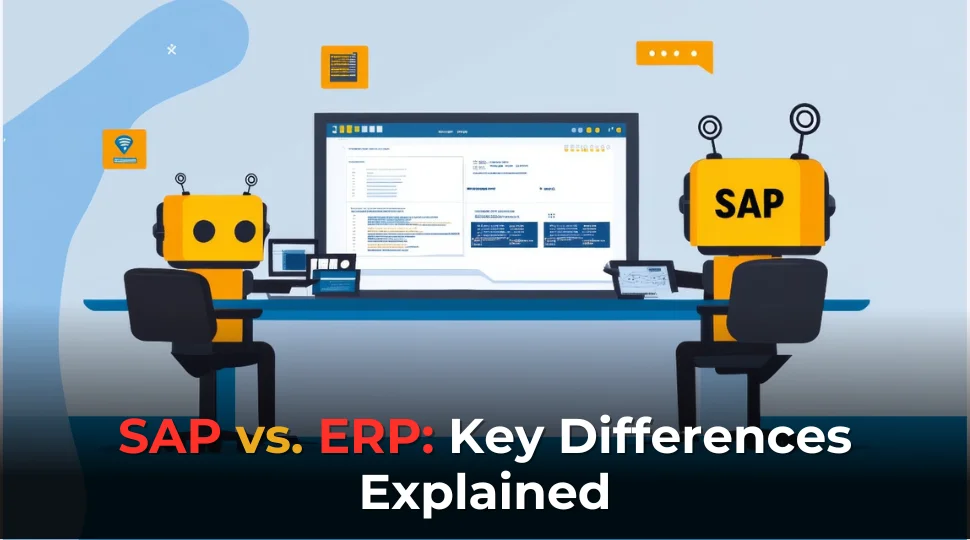Introduction


Now, most businesses compete against general ERP and SAP ERP systems. They perform the same job of work but in relation to two different kinds of needs. Distinguishing such differences, their pros and cons, and giving you options to decide on the best one that you need for your business is exactly what this guide entails.
ERP is business management software that can integrate different departments of an organization into one system.
ERP software is applied to automate business processes, maximize the utilization of resources, and create central databases for businesses to facilitate the best decision-making in business ventures.
1. Finance & Accounting
2. Human Resources Management
3. Supply Chain & Logistics
4. Customer Relationship Management (CRM)
5. SAP is the largest ERP vendor providing niche applications to all sizes of businesses.
SAP is an ERP system, designed to handle complex business processing in the sectors of various industries
Integration of various business functions like finance, HR, and sales are run without hiccups between departments.
Many believe that SAP and ERP are one and the same. Well, not exactly. Here's the difference:
| Feature | ERP | SAP |
|---|---|---|
| Definition | A broad business management system | A specific ERP software provider |
| Functionality | Covers various business processes | Specializes in deep process automation |
| Customization | Varies by provider | Highly customizable |
| Scalability | Medium to high | Designed for enterprises |
| Pricing | More affordable options are available | High investment required |
Choose between SAP or generic, what's correct to pick between and more suited for your SME, depending on the business size and requirements?
1) Generic ERP software is affordable and easily implementable.
2) SAP solution is great for business operations having fewer complexities in their activities.
1) SAP is very flexible and scalable as far as ERP solution goes
2) SAP is very flexible and scalable as far as ERP solution goes
SAP competes with other ERP providers in the market. Let's compare:
Oracle ERP is very versatile but takes a long to learn.
SAP is a lot easier to be user-friendly and particularly very popular in an enterprise
Microsoft Dynamics is perfect for small to mid-sized businesses
SAP is more apt for large enterprises that have complex requirements
NetSuite is cloud-based and excellent for fast-growing businesses
SAP has much stronger industry-specific solutions
Let's see how SAP and ERP systems perform in various industries
A multinational manufacturing company deployed SAP ERP to manage their supply chain operation. It increased its productivity by 30%.
A high hospital system implemented the standard general ERP to optimize in management of a patient's data and billings.
1. Very scalable, particularly for giant enterprises
2. Very secure data management
3. For industries that are rather complex with intricacies in handling business operations
1. Much costlier compared to common general ERP packs
2. Requires education and experience as well
1. Much cheaper than the SAP
2. Easy deployment and maintenance
3. Ideal for Small and Medium-scale organizations
1. Will not be highly scalable
2. Very deep process automation is not covered
3. Will have no complete Deep process automation
ERP Software systems are really fast integrating Artificial Intelligence, cloud computing, and automation because technology does evolve too
1. Predictive analytics for business decisions
2. SAP powered Customer support chatbots
More and more companies have now chosen to shift towards migrating towards a cloud-based ERP solution, the list continues with the top one being SAP S/4HANA Cloud
It would essentially make the business come to better decisions. If scale, automated, and industry-specific solutions require your company then SAP will best be suited to that. In contrast, when a small business requires little cost and generic ERP is much better suited.
Yes, it is one of the most recognizable ERP software companies that helps to make business activities efficient with a lot of processes.
SAP is an ERP system but all the ERP systems are not SAP. If you have specific and adaptable requirements then SAP will be a better one.
Yes, this SAP Business One is designed for small and medium-sized enterprises.
This depends upon the vendor, customized, and on the requirements of implementation. It can go as low as $5,000-$50,000 for small firms. Millions of dollars have to be paid for big enterprises.
Some of the popular alternatives are Oracle ERP, Microsoft Dynamics, NetSuite, and Workday ERP.
